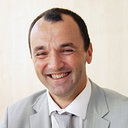Denosumab in patients with giant-cell tumour of bone: an open-label, phase 2 study.
الكلمات الدالة
نبذة مختصرة
BACKGROUND
Giant-cell tumour (GCT) of bone is a primary osteolytic bone tumour with low metastatic potential and is associated with substantial skeletal morbidity. GCT is rich in osteoclast-like giant cells and contains mononuclear (stromal) cells that express RANK ligand (RANKL), a key mediator of osteoclast activation. We investigated the potential therapeutic effect of denosumab, a fully human monoclonal antibody against RANKL, on tumour-cell survival and growth in patients with GCT.
METHODS
In this open-label, single-group study, 37 patients with recurrent or unresectable GCT were enrolled and received subcutaneous denosumab 120 mg monthly (every 28 days), with loading doses on days 8 and 15 of month 1. The primary endpoint was tumour response, defined as elimination of at least 90% of giant cells or no radiological progression of the target lesion up to week 25. Study recruitment is closed; patient treatment and follow-up are ongoing. The study is registered with Clinical Trials.gov, NCT00396279.
RESULTS
Two patients had insufficient histology or radiology data for efficacy assessment. 30 of 35 (86%; 95% CI 70-95) of evaluable patients had a tumour response: 20 of 20 assessed by histology and 10 of 15 assessed by radiology. Adverse events were reported in 33 of 37 patients; the most common being pain in an extremity (n=7), back pain (n=4), and headache (n=4). Five patients had grade 3-5 adverse events, only one of which (grade 3 increase in human chorionic gonadotropin concentration not related to pregnancy) was deemed to be possibly treatment related. Five serious adverse events were reported although none were deemed treatment related.
CONCLUSIONS
Further investigation of denosumab as a therapy for GCT is warranted.
BACKGROUND
Amgen, Inc.


